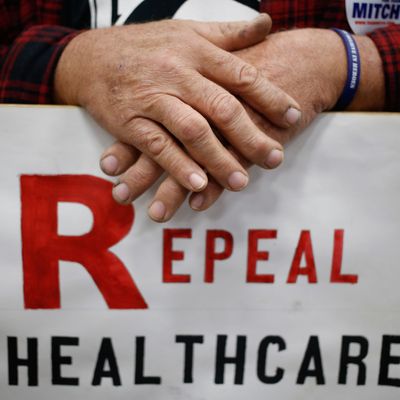
It is not clear whether it’s a trial balloon, a diversionary gesture, or a sign of things to come, but Politico has gotten hold of a “discussion draft” of House provisions repealing (on a staggered timetable) and partially replacing Obamacare, a chore Congress must take on sooner rather than later as part of a budget plan put into motion a week before Donald Trump took office.
Here’s Politico’s own summary of its find:
The legislation would take down the foundation of Obamacare, including the unpopular individual mandate, subsidies based on people’s income, and all of the law’s taxes. It would significantly roll back Medicaid spending and give states money to create high-risk pools for some people with preexisting conditions. Some elements would be effective right away; others not until 2020.
The leaked draft was dated February 10, so it may have already been superseded. But it is more detailed than previous publicly available material on what Republicans were up to.
Much of what is in the draft reflects immediate changes in the Affordable Care Act that have long been expected: substitution of an incentive for “continuous coverage” for Obamacare’s purchasing mandate, and money for states to set up “high-risk pools” to help the otherwise uninsurable. As Sarah Cliff points out in her take on the draft, there’s a lot more money for high-risk pools, and steeper penalties for letting coverage lapse, than in past GOP schemes. A ban on the use of federal funds by abortion providers like Planned Parenthood would apparently take effect immediately, too.
Many of the other provisions would be phased in or delayed until the beginning of 2020. Those include the elimination of Obamacare’s minimum benefit package; cancellation of the higher federal dollar match offered in the ACA for expanding Medicaid; and replacement of Obamacare’s means-tested purchasing subsidies with new tax credits ranging in value strictly based on age, which is treated as an acceptable indicator of health needs. Also repealed is Obamacare’s limits on insurance company price discrimination against old folks. So when it’s all phased in, older people not yet eligible for Medicare could face sharply higher premiums, but receive some tax subsidies not limited by their own incomes.
The Medicaid provisions are very complicated, but it looks like states that expanded Medicaid under ACA will have until 2020 to keep their higher federal-match payments — but then they are gone. And then all states will have to cope with a per capita cap on the total amount of dollars they receive from Washington for the Medicaid population. That big fiscal hit (bigger in the “out years”) will presumably be matched with “flexibility” for states to run Medicaid as they wish, with little or no guarantees of coverage for any specific individuals — in other words, it will no longer be an “entitlement.”
Another big feature of the draft is that Obamacare’s various taxes are repealed and then replaced with the long-standing GOP idea of limiting the tax deductions businesses receive for providing employee health insurance. Like Obamacare’s highly controversial and congressionally delayed “Cadillac tax,” the new provision would expose high-cost employer-sponsored premiums to taxation. When GOP presidential nominee John McCain proposed that in 2008, Barack Obama very effectively accused him of favoring a tax increase.
The inclusion of this potentially toxic provision may help explain some of the plan’s omissions, too, like money for that perennial conservative favorite, Health Savings Accounts to cover routine medical expenses. It could be this draft was really aimed at testing the revenue, spending, and health-coverage consequences the Congressional Budget Office will deduce when the actual bill is sent to CBO for “scoring.” HSAs could be held back temporarily to address (at least theoretically) some big hole in coverage. Or maybe this draft is already ancient history. We will know soon enough, but in the meantime, it’s interesting to see all the loose talk about Obamacare repeal and replacement reflected in legislative language.






























